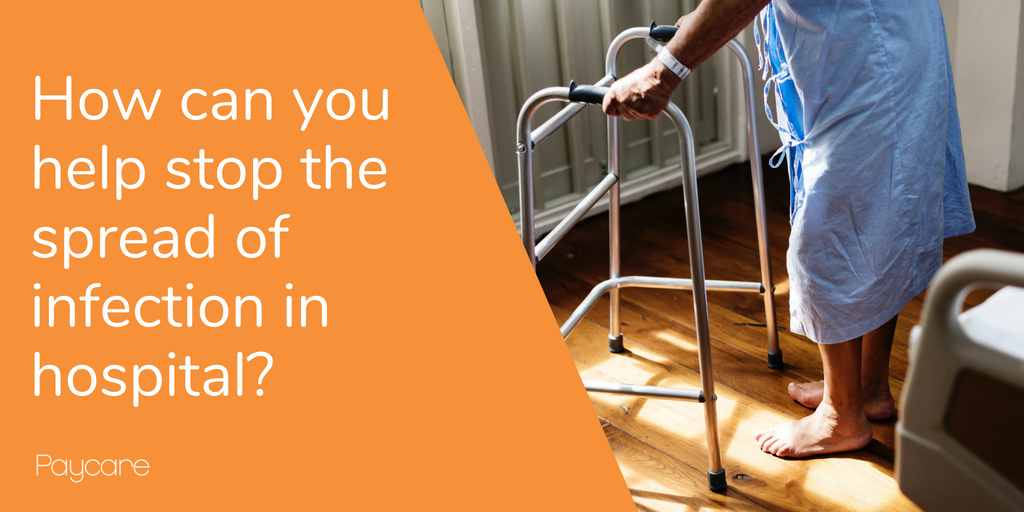While hospitals are generally the place that you go to get better, the very nature of them containing lots of sick people can mean that they are also a place where you might be more likely to pick up germs yourself (or spread them to others).
Our latest guest blogger, Sally Perkins, is a professional freelance writer who has many years’ experience across various areas including charity work and elderly health and wellbeing. In this blog edition, she explains four ways that we can reduce the risk of getting infected at a hospital (and prevent others from being infected).
According to a UK journal found in the Public Health England1, an estimated 300,000 patients become infected during treatment every year. In fact, almost 22.8% of these cases are caused by pneumonia and respiratory infections alone.
1. Make Preparations Before Your Visit
One of the best ways to reduce the risk of catching an infection is by preparing yourself, your body, and your immune system before any scheduled stay at the hospital. This can be achieved by making sure that you eat clean (plenty of fruit and veggies), having an adequate intake of vitamins and minerals, as well as taking probiotics for a healthy gut. Of course, there may be times when you are at hospital unexpectedly, and in these cases, it may be worth asking friends or relatives if they can keep you stocked up with plenty of items that will benefit your health and get you on the road to recovery sooner.
2. Maintain a Positive Mindset
While some of us don’t mind being in hospitals, others can worry about the treatment they’re having, feel at unease due to the clinical and sterile atmosphere, or be negatively impacted by the wider goings on such as the lighting, equipment, noises, or even other patients.
Asking a friend or family member to visit you can lift your spirits, and making sure you get regular fresh air, plenty of sleep, and relaxation can also help. In fact, almost 20% of elderly patients develop delirium2 during their stay due to lack of sleep often caused by constant beeping and noises. So it’s important to make sure you look after you, as the more rest you get, the faster you will recover.
3. Keep Your Hands Clean
Not a surprising one, but a simple yet hugely effective way to reduce the spread of illnesses and infections is by cleaning your hands often3. In hospitals, there are plenty of hand sanitisers as you enter rooms and hallways, and it’s key to make sure you’re as hygienic as possible during your stay – even the choice of sanitising your hands after holding a door open can mean the difference between getting ill or staying fit and well.
4. Keep Hydrated
Drinking water at regular intervals throughout your entire stay is important to maintaining optimum health physically and mentally4. It can be tricky asking staff for water regularly because you might feel like you’re interrupting their work, so it may be worth bringing a jug to keep in your room which you can fill up when you need to. This will keep you well hydrated and help your body fight off infections. If you’re unsure, there are signs to help you know if you are dehydrated which may include sleepiness, dry skin, dizziness, headaches and muscle fatigue.
Recovering as quickly as possible after any hospital stay is the ideal goal, and though they are generally highly hygienic places to be, there are environmental and physical factors to consider – things that you can’t necessarily get away from such from germs and bacteria in the air, to things you can control such as not drinking enough water or cleaning your hands regularly5. But if you are mindful of what you can do to reduce your risks of catching an illness while you’re there, you can focus on getting yourself back to normal.
***
As a Paycare Policyholder, you can claim back money for any day cases or nights that you’ve spent in the hospital (up to your annual limit). You can find out more here: https://www.paycare.org/health-cash-plans/what-our-plans-cover/
References
1 | NICE – Hospital Infections | https://www.nice.org.uk/guidance/qs61/chapter/introduction
2 | Delirium in Hospitals | https://www.ncbi.nlm.nih.gov/pmc/articles/PMC2845764/
3 | Hand Cleanliness | https://www.gosh.nhs.uk/parents-and-visitors/coming-hospital/infection-prevention-and-control
4 | Top Tips to Keep Hydrated | https://www.paycare.org/paycare-blog-paycare-news/are-you-cool-top-tips-to-stay-healthy-hydrated/
5 |Hospital Cleanliness | https://www.penn-jersey.com/hospital-cleaning

